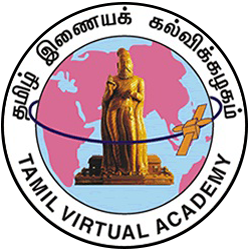Primary tabs
-
Page 5
2.
where the origin of a word is Tamil, it is given in Tamil script ; in other cases it is given in italicized Roman script ; this transliterated derivation is, except for Sanskrit words, preceded by the abbreviated name of the language to which it belongs.
3.
Where a word is derived form English and has the same meaning as the English word, that English word is given as the meaning, preceded simply by < E.
4.
Where, for the meaning of a ord, reference is made to a variant, no derivation is given, as the same will be clear form the variant referred to.
5..
In the cases of compound words, the derivation is indicated for the firs element alone ; but, elements other than the first are also shown (1) when they are so blended by sandhi that they cannot be easily recognized or (2) when they are not of native origin. The final element omitted after the sign + will be found elsewhere in the Lexicon.
6.
'id'. indicates that the derivation is the same as for the previous word. But in the case of main words, the derivations are repeated , e.g., இங்கிதக்கவி and இங்கிதம்,
7.
If the origin of a word is an uninflected nominal stem, the derivation is given in its uninflected form, e.g., இமம் Where the derivation is form a case form, this is given, as in இமவான், குரவன், புவி,
8.
Though the source given may appear appropriate to only one meaning of the word, it must be held true of the other meanings also, because words change their senses in various ways.
9.
in suggesting sources, the immediate, and not the ultimate, source is usually given.
IV. The Cognates
For words of Dravidian origin, cognates form kindred languages Telugu, Kanarese, Malayalam, Tulu, etc., are given within square brackets. if of several meanings given to a word, one alone has cognate forms given, it is to be understood that the Tamil word that particular meaning has such cognate forms, and not the word with other meanings.
VI. The Meanings
1.
The Lexicon has adopted the following principles in arranging the meanings of words
a.
Where chronological arrangement is possible, it is followed
b.
Where it is not possible, a logical arrangement is followed ; but this is modified by the principle of arranging the meanings in the order of comparative familiarity in usage.
c.
In words of non-Tamil origin, the senses they bear in the original tongue are given precedence over their significances, irrespective of chronological order.
Page

HOME

